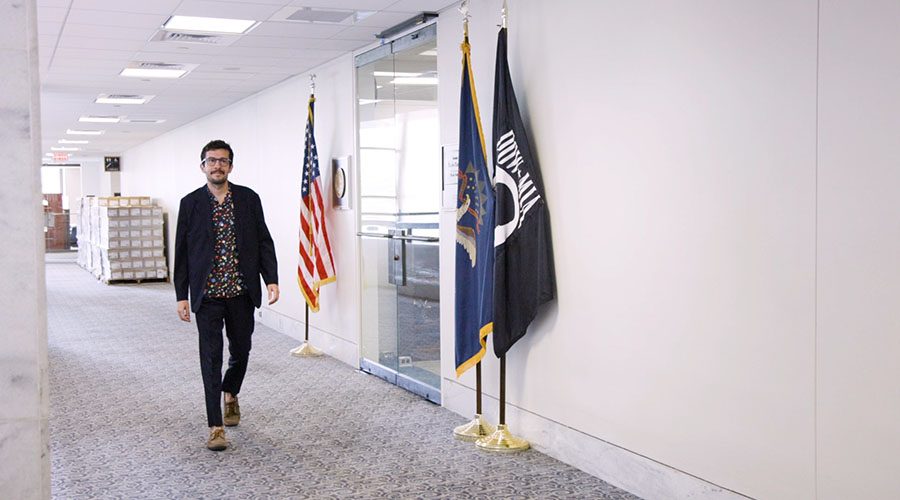By Tawanda W. Johnson | October 13, 2023

Credit: American Physical Society
Thomas Plumb-Reyes
After a year on Capitol Hill, physicist Thomas Plumb-Reyes views science policy as his next frontier.
“I still love science, but I am much happier now learning about the science that other people did and not having to do it myself,” said Plumb-Reyes, who just wrapped up a year as an APS Congressional Science Fellow in Washington, DC.
Plumb-Reyes worked in the office of Rep. Steve Cohen of Tennessee, and he recently parlayed that experience into his current role as a 2023 AAAS Executive Science and Technology Policy Fellow for the State Department’s Office of the Special Envoy for Critical and Emerging Technology.
APS Congressional Science Fellows use their scientific knowledge to help members of Congress, few of whom have technical backgrounds, in the policymaking process. They complete a two-week orientation in Washington, DC, interview on Capitol Hill, and then choose a congressional office or committee to serve for a year — usually from September to August.
During his fellowship, Plumb-Reyes helped to write and introduce bills, and assisted local organizations in navigating the federal grant process.
“I tried to approach this year as, foremost, a learning experience,” he said. “What one is able to accomplish in Congress in one year is influenced by so many things that are out of one’s control.”
Alexandra Schnelle, deputy chief of staff for Rep. Cohen, said Plumb-Reyes “made a significant impact” during his fellowship, “from his expertise on artificial intelligence” to his efforts “to determine the best ways to reform the Tennessee Valley Authority.”
“One of the bills he worked on even successfully passed out of a committee,” Schnelle added —a sometimes difficult feat in the House of Representatives.
Having a science background was helpful, said Plumb-Reyes. “There was a fair amount of overlap in skills that were useful for working in Congress and skills that I first developed as a scientist,” he said, “including communicating complex ideas clearly and accurately and for a variety of different audiences.”
He practiced his people skills, too. “I met so many smart, dedicated, and hardworking people in Congress who are sincerely trying to help make the world a better place,” he said — even though “well-documented institutional and systemic issues remain.”
Indeed, working in Congress can be challenging. “It’s extremely unlikely you’ll come in and, armed with just the right knowledge and citations, completely change anyone’s mind on climate change or gender-affirming care,” Plumb-Reyes said.
“But that doesn’t mean there isn’t still a lot of good work you can do on a vast number of important challenges facing the country and the world.”
Applications for the next class of fellows are open until Dec. 1, 2023. To learn more, visit the APS Congressional Science Fellowship site.
Tawanda W. Johnson is the Senior Public Relations Manager at APS.
©1995 - 2024, AMERICAN PHYSICAL SOCIETY
APS encourages the redistribution of the materials included in this newspaper provided that attribution to the source is noted and the materials are not truncated or changed.
Editor: Taryn MacKinney
November 2023 (Volume 32, Number 11)
Articles in this Issue

